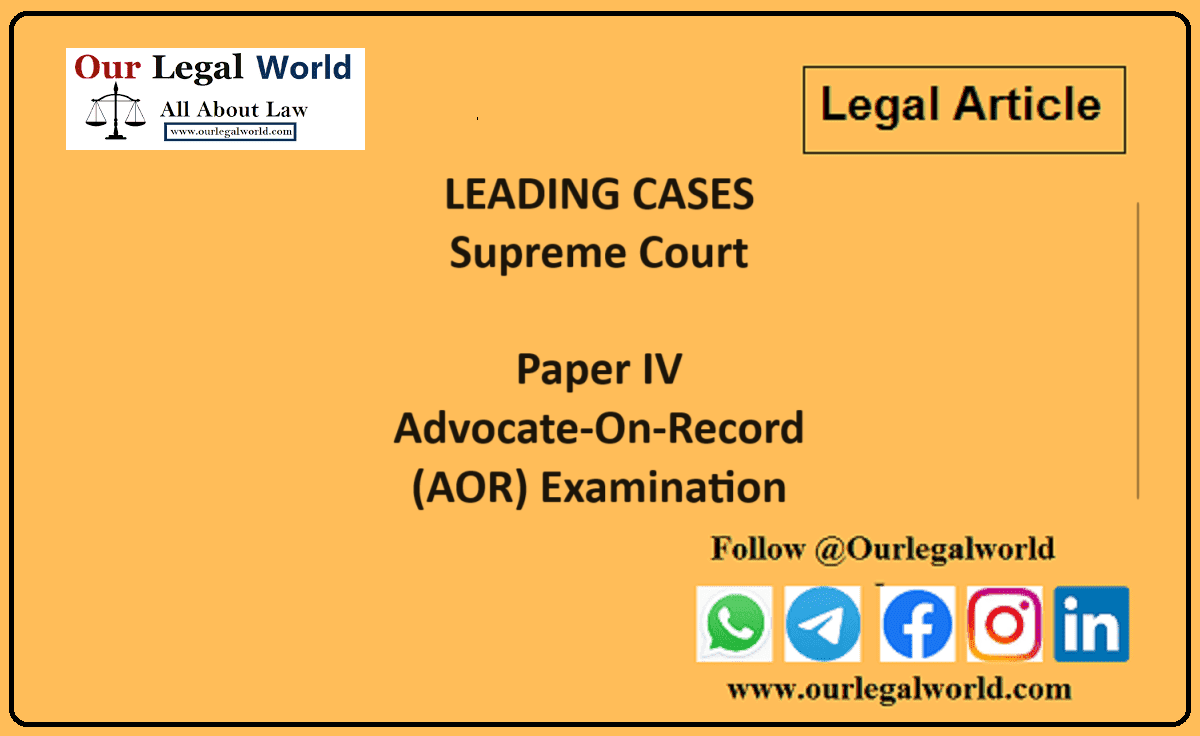DOLI INCAPAX- Legal Maxim- Our Legal World
MEANING
Doli incapax is the principle of criminal jurisprudence which states the criminal liability of children. It basically means ‘incapacity of child’ which states, that a child cannot be held legally responsible for the acts or action and also cannot be convicted of a criminal offence.
As per the principal, no child below the age seven years would be prosecuted for commission of any offence and for the children above seven years and below twelve years of age, the prosecution will have great burden of proof that the minor was capable of understanding the act or was having sufficient knowledge of nature of the act or else the child will not be convicted of any offence.
LEGAL PROVISIONS RELATING ‘DOLI INCAPAX’
Section 82 and 83 of the Indian Penal Code exempted the wrongful acts of the children from the criminal liability.
- Explanation
Section 82 of IPC
Act of child who is under seven years of age
In India, Criminal law acknowledges an age line under which children are not capable of crime. The Section provides with complete exemption from the criminal liability to children who is under the age of seven years.Therefore, it states that nothing is an offence done by child who is under the age of seven years.This is due to lack of ability of child under the age of 7 years to have sufficient knowledge of the nature of the act. This is a complete defence and cannot be taken away in any circumstances. No point to prove whether the child could understand the nature of the act and the consequences will act as a rebuttal.
Section 83 of IPC
Act of child above seven and below twelve years of age of immature understanding
Nothing is an offence which is done by a child above seven years and below twelve years of age, who does not have sufficient understanding to judge the nature and consequences of his conduct on that occasion.
Between the age of seven to twelve years, the code provides for presumption of innocence in favour of child. But if, the prosecution gets proved and provide with some evidence them the child will be prosecuted. However, in order to prove that the child is liable for his acts, they must prove that the child was having the knowledge that his act was wrong and was knowing the consequences arising out of the act.
Section 108 of IPC
Offence of Abetment
This Section relates to the offence of abetment. Abetment basically means actions of instigating, provoking or encouraging a person to commit an offence. In relation to the principal, it is however not necessary that the person abetted would be capable of committing an act or have the knowledge of act as that of the abettor.
Hence, if a person abets a child whose age is below seven years or a child above seven and below twelve years of age then even if the child is incapable of being convicted of the offence committed by him, the abettor who abetted the child to commit an offence will be held liable for the offence.
ILLUSTRATION
- A with guilty intention abets B a child of 6 year old to do an act which causes D’s death. Here, the child will not be held liable for the act as he is Doli Incapax. However, A will be liable for the murder of D.
- A instigates B a 10 year old child to set fire to a dwelling house. B without knowing the consequence of the act, without knowing the nature of the act sets fire to the house. Hence, B has committed no offence as he was incapable of knowing the consequences of the act and therefore A will be held liable for abetting the offence and will be given punishment.
Also Read: Rule of Strict Liability & Absolute Liability under Law of Torts
CASE LAW
-
In Krishna Bhagwan v. State of Bihar;
The High Court of Patna held that if at the time of commission of an offence or during the trial the child (accused) completes the age of seven years then such child can be convicted by the court if it can be proved that the child is capable of understanding the nature of the act and knew the consequences of the offence.
- In Heeralal v. State of Bihar;
A minor child carrying a knife with him, threatened a person that he would kill him. The child lately attacked a person with the knife and stabbed him until he died. When taken to court, he took the defence of section 83 of IPC. The Court in his statement stated the child to be convicted of offence saying, he had gained sufficient knowledge to know the consequences of the act as he was carrying a knife, threatening a person to death and later killing him.
CONCLUSION
Doli incapax is legal maxim which mean ‘incapable of crime’. The provisions can be seen in Section 82 and 83 of Indian Penal Code, 1860. As in India, children below the age of seven years are been exempted from any criminal liability as they are incapable of understanding the action or the act or does not have enough knowledge of what can be the consequences of the act been committed by him. And the children above the age of seven years and below twelve years would be exempted from any criminal liability, if it is proved that at the time of offence the children was incapable of committing any act and do not know what is wrong or right during the conduct. Hence, it exempts the liability of children from any offence which are minor and below the age of twelve years and gives to it.







![Tax Law Internship at Legum Attorney [Chamber of Ashish Panday], Delhi : Apply by 15th May 2025](https://www.ourlegalworld.com/wp-content/uploads/2025/05/IMG_0113-min.png)

